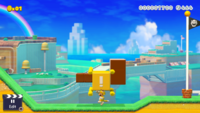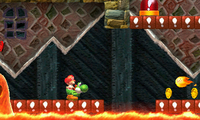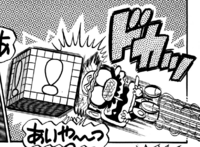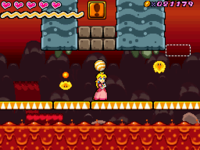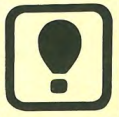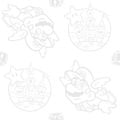! Block
- Not to be confused with ? Block or Surprise Ball.
| ! Block | |
|---|---|
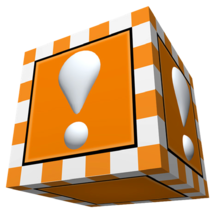 Yellow block artwork from Super Mario 64 | |
| First appearance | Super Mario World (1990) |
| Latest appearance | Super Mario Bros. Wonder (2023) |
! Blocks, also called Exclamation Mark Blocks[1] or ! Platforms,[2] are floating blocks that first appear in Super Mario World. Since their debut, ! Blocks have made recurring appearances in the Super Mario franchise, appearing in various colors and serving different functions. In most games, hitting a ! Block causes a certain event to occur; in others, ! Blocks instead release items, or do nothing at all and simply serve as platforms.
History[edit]
Super Mario series[edit]
Super Mario World / Super Mario World: Super Mario Advance 2[edit]
In Super Mario World and its reissue, there are four types of Exclamation Mark Blocks (also referred to as Switch Blocks):[3] Yellow Blocks[4] (or Mushroom Blocks),[5] Green Blocks,[6] Red Blocks,[7] and Blue Blocks.[8] They all start out as outlines, more specifically Dotted-Line Blocks. Mario or Luigi can turn every Exclamation Mark Block of a certain color solid by activating its ! Switch in the corresponding Switch Palace. Exclamation Mark Blocks mainly serve as platforms, although the Yellow and Green Blocks always contain a specific power-up too: a Super Mushroom and Cape Feather, respectively. The Red and Blue Blocks do not contain any power-up and only serve as platforms and/or walls.
Super Mario 64 / Super Mario 64 DS[edit]
In Super Mario 64, all four color variations of ! Block return, each with a distinct purpose. The red, green, and blue ones are collectively called Cap Blocks, and they start the game as transparent outlines. Mario can turn all of them solid if he activates each of their corresponding Cap Switches. Yellow blocks[9] (or Yellow Blocks),[10] also named ! Boxes,[11] are the most common variant. They contain various items, such as coins, a Power Star, or a 1UP Mushroom. Some even contain a Koopa Shell.
In Super Mario 64 DS's Adventure mode, due to cap changes, the three Cap Blocks were reduced to a type of red ? Block. However, yellow blocks (simply called ! Blocks)[12] retain their role. In VS Mode, a large yellow block called a VS Item Block[13] appears in the courses Sunshine Isles and Battle Fort, and it provides Yoshi, Luigi, and Wario with Wings. In the Korean version, a yellow block appears on the roof of the Mushroom Castle, and it grants unlimited 1-UPs.[14][better source needed]
Super Mario 3D Land[edit]
Both regular block-sized and large red ! Blocks appear in Super Mario 3D Land in multiple levels, including World 4-2, World 4-3, and Special 4-![]() Airship. Each time one is hit, it spawns a face block in a specific path, often leading to out-of-reach locations and collectibles, though the blocks disappear after a short time. The ! Block darkens after all of its face blocks have been spawned, and it can be hit again after all of the face blocks have disappeared.
Airship. Each time one is hit, it spawns a face block in a specific path, often leading to out-of-reach locations and collectibles, though the blocks disappear after a short time. The ! Block darkens after all of its face blocks have been spawned, and it can be hit again after all of the face blocks have disappeared.
Super Mario 3D World[edit]
- Main article: Switch Block (Super Mario 3D World)
A large red ! Block known as a Switch Block appears in Super Mario 3D World, and it changes tracks when hit.
Super Mario Maker 2[edit]
In Super Mario Maker 2, giant yellow ! Blocks appear as course elements in the Super Mario 3D World style. When hit multiple times, they produce giant Empty Blocks in an identical manner to the Mega ? Blocks in Super Block Land in Super Mario 3D World. When ground-pounded, the blocks appear all at once. After a period of time, the blocks disappear. In editing mode, the path in which the blocks form can be set by the player like Snake Blocks, Clear Pipes, and Piranha Creepers.
Super Mario Bros. Wonder[edit]
Standard-sized ! Blocks return in Super Mario Bros. Wonder when wearing the Add ! Blocks badge. They will appear in predetermined locations in courses, and may serve as platforms or contain coins or items. In this game they feature a plain look, reminiscent of their appearance in Super Mario World, with a more rounded exclamation mark instead of the angular design introduced in Super Mario 3D Land.[15][16] Like ? Blocks, ! Blocks turn purple during Wonder Effects.
Hotel Mario[edit]
In a cutscene of Hotel Mario, Luigi kicks a ! Block that then grows a beanstalk in order to reach Lemmy's High-ate Regency Hotel.
Wario Land series[edit]
Wario Land: Super Mario Land 3[edit]
Both small and large ! Blocks (referred to as switches)[17] appear in Wario Land: Super Mario Land 3, triggering different events when hit. In Course No.05, Course No.15, and Course No.38, a ! Block can be found in a small room and causes certain unbreakable blocks in the previous room to disappear. The giant ! Blocks appear instead of goal doors at the end of Course No.12, Course No.38, and Course No.39. In Course No.12, activating the giant ! Block causes the lid to fall on top of Mt. Teapot, turning Course No.10 into Course No.13; in Course No.38 and Course No.39, the ! Blocks demolish the outer portions of Syrup Castle, revealing its core (later revealed to be a statue of Princess Toadstool).
Wario Land 4[edit]
In Wario Land 4, switches emblazoned with an ! mark turn Dotted-Line Blocks into solid ! Blocks, as well as activating some ladders and semi-solid platforms. They come in red, green or purple colors and activate objects of the same color.
Yoshi's Island series[edit]
In Super Mario World 2: Yoshi's Island (and its GBA reissue), Yoshi's Island DS, and Yoshi's New Island, Dotted-Line Blocks temporarily become solid ! Blocks after a nearby Switch is pressed, allowing a Yoshi to use them as platforms. In the Yoshi's Island DS level Yoshi's Island Easter Eggs, they are referred to as "fickle blocks".
Super Mario-kun[edit]
Several ! Blocks appear in Super Mario-kun, where their role reflects whatever the volume is adapted from. In volume 16 of Super Mario-kun, which is based on Super Mario 64, they give Mario power-ups the same as in the game.
Mario Party[edit]
! Blocks can also be seen as part of the treasure hoard inside the safe in the Mario Party minigame Key-pa-Way. One of the ! Blocks is purple. Also, in the Mushroom Bank, the safe that keeps the items bought from the Mushroom Shop resembles a red ! Block.
Super Smash Bros. series[edit]
! Blocks appear on Princess Peach's Castle in Super Smash Bros. Melee and Super Smash Bros. Ultimate, where they, alongside two same-colored platforms, appear for a brief time after the player presses a switch of the same color (red, blue, or green). They release items when hit or touched, becoming empty upon doing so. In addition, the green block from Super Mario 64 appears as the Metal Box item in the Super Smash Bros. series starting with Super Smash Bros. Melee.
Mario & Luigi series[edit]
A few ! Blocks also appear in all installments of the Mario & Luigi series (called Switch Blocks in Mario & Luigi: Superstar Saga[18] and Event Blocks in Mario & Luigi: Partners in Time[19]). They have various functions and can activate events. Purple-colored ! Blocks are introduced in these games, and they have varying effects. These blocks are colored orange in Mario & Luigi: Dream Team and Mario & Luigi: Paper Jam. Three special ! Blocks in Mario & Luigi: Partners in Time are used to create three giant ! Blocks on Yoshi's Island and destroy giant ! Blocks of the same color in Thwomp Caverns, allowing the Mario quartet to traverse farther down the volcano. The blue variety later appears in the Star Shrine, where it would change color depending on whether Baby Mario or Baby Luigi hit it.
Super Princess Peach[edit]
! Blocks, coming in a pink version of their Super Mario 64 appearance, also appear in Super Princess Peach, where they each contain a trapped Toad that needs to be rescued. There are three in each level, and each Toad needs to rescued in order to complete the game. The Toad's cry for help can also be faintly heard when the player is near the block. Orange ! Blocks with an original design also appear, and they serve as switches to toggle certain platforms.
Yoshi's Woolly World / Poochy & Yoshi's Woolly World[edit]
In Yoshi's Woolly World and its Nintendo 3DS version, ! Blocks function identically as in the Yoshi's Island series.
Minecraft[edit]
In the Super Mario Mash-up in Minecraft, a yellow block from Super Mario 64 appears as a painting, along with the red, green, and blue Cap Blocks. 3D pixel art of red and orange ! Blocks appears in the world premade for the pack.
The Super Mario Bros. Movie[edit]
In The Super Mario Bros. Movie, yellow ! Blocks can be seen inside the antiques shop.
Mario Kart Tour[edit]
A green ! Block replaces the Green Fuel brand in one of the advertisements in Wii Moonview Highway.
Profiles[edit]
Super Mario World: Super Mario Advance 2[edit]
- Prima Games: "Red, Yellow, Green, and Blue Switch Blocks are not solid and appear only as outlines when you first see them. When you hit the Switch in the appropriate Switch Palace, however, the outlined blocks become solid blocks of that color with exclamation points on them. They often allow you to reach areas you couldn’t normally get to."[3]
Super Mario Maker 2[edit]
- North American website bio: "The ! Block extends when hit. Ground pound to expand it faster."
Gallery[edit]
Additional names[edit]
Internal names[edit]
| Game | File | Name | Meaning
|
|---|---|---|---|
| Yoshi's New Island | G:/content0.game/romfs/obj.bch.z | obj_blk_switch01a | Switch Block; compare arrow block |
Names in other languages[edit]
| Language | Name | Meaning |
|---|---|---|
| Japanese | ビックリブロック[20] Bikkuri Burokku きいろいブロック[21] Kiiroi Burokku 黄色いブロック[22] Kiiroi Burokku オレンジブロック[23] Orenji Burokku |
Surprise Block Yellow Block (Super Mario 64) Yellow Block (Super Mario 64) Orange Block (Super Mario 64 DS) |
| Chinese (simplified) | !砖块 ! Zhuānkuài |
! Block |
| Chinese (traditional) | !磚塊[26] ! Zhuānkuài |
! Block |
| Dutch | !-blok |
! Block |
| French | Bloc en point d'exclamation Bloc ! (Super Mario Maker 2) |
Exclamation mark block ! Block |
| German | !-Block |
- |
| Italian | Blocco ! Blocco "!" giallo[24] Pulsante ! (Wario Land 4) |
! block Yellow ! block ! Switch |
| Korean | !블록[27] ! Beullok |
! Block |
| Portuguese (NOA) | Bloco de Exclamação |
Exclamation Block |
| Portuguese (NOE) | Bloco ![25] |
! block |
| Russian | Блок «!» Blok «!» |
Block "!" |
| Spanish | Bloque ! |
! block |
Trivia[edit]
- In some pre-release versions of New Super Mario Bros., a yellow block from Super Mario 64 can be seen, automatically switched to a green block from the same game if hit.[28]
- In New Super Mario Bros. Wii, there is a red ! Switch, which activates Red Blocks, that acts similarly to the ones in Super Mario World, but there are no "!" symbols on them.
See also[edit]
References[edit]
- ^ (1991). Super Mario World instruction booklet. Redmond: Nintendo of America (American English). Page 21.
- ^ "The ! Platforms will flash on and off after you stomp a Switch, giving you time to jump through them to another Switch." – Williams, Drew. Yoshi's Island: Super Mario Advance 3 Player's Guide. ISBN 1-930206-25-9. Page 126.
- ^ a b Stratton, Bryan (February 26, 2002). Super Mario World: Super Mario Advance 2 Prima’s Official Strategy Guide. Prima Games (American English). ISBN 0761539131. Page 17.
- ^ (August 1991). Mario Mania Player's Guide. Nintendo of America (American English). Page 58.
- ^ (September 1991). Nintendo Power Volume 28. Nintendo of America (American English). Page 18.
- ^ (August 1991). Mario Mania Player's Guide. Nintendo of America (American English). Page 125.
- ^ (August 1991). Mario Mania Player's Guide. Nintendo of America (American English). Page 98.
- ^ (August 1991). Mario Mania Player's Guide. Nintendo of America (American English). Page 107.
- ^ (1996). Super Mario 64 English instruction booklet. Redmond, WA: Nintendo of America (American English). Page 18.
- ^ (1996). Super Mario 64 Player's Guide. Nintendo of America (American English). Page 21, 69, 80, 92, 96, 108, and 127.
- ^ (1996). Super Mario 64 Player's Guide. Nintendo of America (American English). Page 8.
- ^ (2004). Super Mario 64 DS instruction booklet. Nintendo of America (American English). Page 29.
- ^ Super Mario 64 DS internal object name (VS_ITEM_BLOCK)
- ^ Video showing the ! Block in the Korean version of Super Mario 64 DS. Naver. Retrieved October 15, 2020.
- ^ GameSpot (August 31, 2023). Super Mario Bros. Wonder Preview. YouTube. Retrieved September 18, 2023.
- ^ IGN (August 31, 2023). Super Mario Bros. Wonder: The First Preview. YouTube (English). Retrieved September 18, 2023.
- ^ (March 1994). Nintendo Power Volume 58. Nintendo of America (American English). Page 80, 83, and 88.
- ^ Thomason, Steve (2003). Mario & Luigi: Superstar Saga Player's Guide. Nintendo of America (American English). ISBN 1-930206-43-7. Page 11.
- ^ Hoffman, Chris (November 18, 2005). Mario & Luigi: Partners in Time Player's Guide. Nintendo of America (American English). ISBN 1-59812-006-9. Page 10.
- ^ Sakai, Kazuya (Ambit), kikai, Akinori Sao, Junko Fukuda, Kunio Takayama, and Ko Nakahara (Shogakukan), editors (2015). 『スーパーマリオブラザーズ百科: 任天堂公式ガイドブック』. Tokyo: Shogakukan (Japanese). Page 61, 186.
- ^ Super Mario 64 Japanese instruction booklet, page 18.
- ^ ---- (2015). "Super Mario 64."『スーパーマリオブラザーズ百科: 任天堂公式ガイドブック』. Tokyo: Shogakukan (Japanese). Page 91.
- ^ Super Mario 64 DS Japanese instruction booklet, page 29.
- ^ Super Mario Bros. Enciclopedia, pag. 91
- ^ Nintendo Portugal (May 15, 2019). Super Mario Maker 2 Direct - 15/05/2019. YouTube (Portuguese). Retrieved August 7, 2021.
- ^ Official traditional Chinese website for Super Smash Bros. Ultimate. Retrieved April 5, 2020.
- ^ 한국닌텐도 공식 채널 (May 16, 2019). 슈퍼 마리오 메이커 2 Direct 2019.5.16. YouTube (Korean). Retrieved November 11, 2022.
- ^ (November 1, 2009). NSMB E3 - Early Prototype (0:51). YouTube. Retrieved May 13, 2024.
- Blocks
- Mario & Luigi: Superstar Saga objects
- Mario & Luigi: Partners in Time objects
- Mario Pinball Land objects
- Super Mario 3D Land objects
- Super Mario 64 objects
- Super Mario 64 DS objects
- Super Mario Maker 2 objects
- Super Mario Bros. Wonder objects
- Super Mario World objects
- Super Mario World 2: Yoshi's Island objects
- Super Princess Peach objects
- Wario Land: Super Mario Land 3 objects
- Yoshi's Island DS objects
- Yoshi's Island: Super Mario Advance 3
- Yoshi's New Island objects
- Yoshi's Woolly World objects
